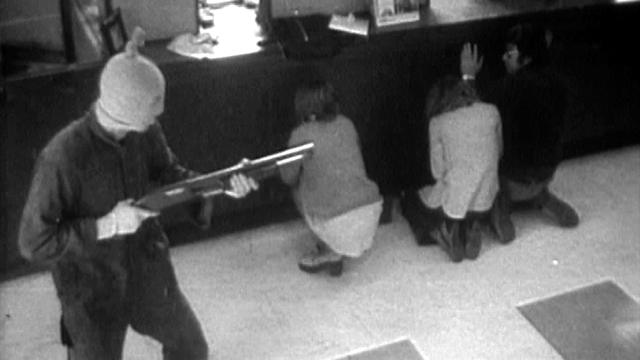In the Firing Line
Guns, drugs and cash. Welcome to the world of high-powered bank robberies. But what pushes someone to risk everything to rob a bank?
 Guns, drugs and cash. Welcome to the world of high-powered bank robberies. But what pushes someone to risk everything to rob a bank? In this probing and character-led documentary, several convicted robbers candidly discuss their crimes. Why is bank robbing so addictive? We also hear from those at the other side of the gun, left traumatised and scarred. Made for ABC Australia's renowned Four Corners Strand, this is a disturbing insight into the human cost of bank robberies.
Guns, drugs and cash. Welcome to the world of high-powered bank robberies. But what pushes someone to risk everything to rob a bank? In this probing and character-led documentary, several convicted robbers candidly discuss their crimes. Why is bank robbing so addictive? We also hear from those at the other side of the gun, left traumatised and scarred. Made for ABC Australia's renowned Four Corners Strand, this is a disturbing insight into the human cost of bank robberies.
"I didn't have to say a word, just walked in there with a shotgun. People didn't assume I was looking for a home loan," boasts convicted bank robber Anthony. "It's like your own little Wild West and you're running the joint," The thrill of power, along with the promise of lots of cash, has proven irresistible time and again for bank robbers. However, for the victims of their crimes, the trauma refuses to go away.
Pam is one such victim. She was a senior bank employee whose life and career were turned upside down after she was brutally attacked in a robbery. "One of them had a gun, one had iron bars, one had a hunting knife. So it wasn't the type of thing you could really argue with," she murmurs. When Pam delayed handing over the keys to the safe, she was physically assaulted. "He hit me from behind and pushed me into a metal door," she recalls. She was left with a slipped disc and still suffers from back spasms today.
Pam's distress was further compounded by the callous attitude of her employers. On returning to work, she was told she would be demoted, despite 25 years of loyal service. "I was basically asked to sign documentation to reduce my position from a managerial status to a clerk," she explains. Unsettlingly, her case seems typical. Far from helping traumatised workers like Pam, banks often demote or dismiss them.
However, victims can at least expect sympathy from one unlikely source. Anthony, a born-again Christian, once committed 4 armed robberies in 16 days. He was arrested when his mother recognised him on the local news and turned him in. Now only the dense web of tattoos along his limbs points to his murky past. He is contrite and ashamed, adamant that he will repay his victims, even if, as he calculates, it will take him until he is 93. "I fully understand everyone in those banks hating me," he admits.
Unfortunately, most robbers are not as repentant. Some are startlingly flippant about the emotional damage they have caused. "They'll tell you anything - that they can't go to a counter any more because they've got some sort of phobia that they've created - that's absolute bullshit. All they're trying to do is jump on the gravy train," an anonymous robber remarks. His words jar nastily with Pam's palpable distress.
Worryingly, bank robberies seem to be becoming more violent and unpredictable. Fuelled by a cocktail of drugs and adrenaline, the robbers are oblivious to their victims' pleas. "You're in the car, you have a shot. Throw the needle on the floor, go in, produce your gun. Mate that's the biggest adrenaline buzz ever. It's better than bungee jumping," enthuses an anonymous robber. And until the banks can fork out to provide better security, their own employees will continue to pay the price.
FULL SYNOPSIS

